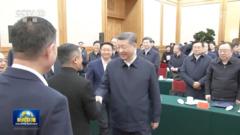Experts analyze the implications of Jack Ma's appearance at a high-profile meeting attended by President Xi Jinping, indicating a potential shift in the government's stance towards the private sector.
Jack Ma's Resurgence: A Sign of Change for China's Tech Landscape

Jack Ma's Resurgence: A Sign of Change for China's Tech Landscape
The return of Alibaba’s co-founder to the public eye prompts mixed interpretations about China's tech policies and economic future.
Jack Ma, the co-founder of Alibaba and a noteworthy figure in China’s technology sector, has re-emerged in public life at a meeting with President Xi Jinping and key business leaders, sparking significant discussion about its implications. After a period of relative silence following his critical remarks about the financial sector in 2020, Ma's involvement at the recent event has excited investors and analysts alike, particularly given the immediate positive reaction in tech markets, including an 8% rise in Alibaba's shares.
Analysts widely interpret Ma's symbolic presence—especially his front-row seat near Xi—as indication of a possible rehabilitation following years of stricter oversight of the tech industry. Japanese analyst Bill Bishop emphasized that such visibility suggests a reinstatement of his status, despite the lack of a speaking role or extensive media coverage, hinting that a full restoration of his former influence has yet to be realized.
The significance of this assembly is further underscored by Xi Jinping's call for innovation and growth, suggestive of the government’s ambivalence towards the private sector. This gathering took place against the backdrop of a broader crackdown on tech firms—the "common prosperity" campaign—a series of policies aimed at limiting the influence of billionaires and redistributing wealth.
The discussion of Ma's return to public life also invites speculation about the future of government regulations affecting tech companies. Following a period of deepening economic challenges, analysts like Richard Windsor noted that Ma's return could signify governmental fatigue with the "stagnation" seen in the private sector and a potential openness to allowing more autonomy.
Furthermore, this event coincided with critical innovations in AI technology by companies like DeepSeek, which became major players in the global tech environment. China's desire to enhance its competitiveness in advanced technologies such as AI and semiconductors led analysts to question whether this meeting could signal a deviation from past regulatory measures towards a more growth-focused collaboration with tech leaders.
As the global landscape shifts, particularly with rising tensions and sanctions from the U.S. against Chinese tech advancement, some experts argue that Xi’s approach will emphasize coordination with entrepreneurs, aligning their goals with state priorities. Marina Zhang, an associate professor at the University of Technology Sydney, articulated that the gathering might not signify the end of tech scrutiny but a pivot toward "controlled engagement."
This nuanced evolution in the relationship between Beijing and its tech industry highlights an intricate balancing act that seeks not only to foster private sector success but also adherence to national goals of economic modernization and self-sufficiency in crucial technological areas.






















